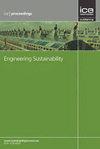Development of sustainable concrete using rice husk ash and refractory brick waste: a systematic approach
IF 1.5
4区 工程技术
Q3 ENGINEERING, CIVIL
Proceedings of the Institution of Civil Engineers-Engineering Sustainability
Pub Date : 2023-01-12
DOI:10.1680/jensu.22.00003
引用次数: 0
Abstract
This current experimental research work is undertaken to assess the possibility of implementing sustainability by developing concrete mixes by utilising rice husk ash (RHA) and refractory brick waste (RBW) as a supplement to cement and coarse aggregates respectively. To fulfil the objective mentioned earlier, a systematic study comprising of evaluation of impact of RHA and RBW on concrete behaviour has been performed by carrying out different tests of strength and durability. These tests are conducted on specimens of specified mixes designed by varying the RBW as 0, 25%, and 50% and RHA levels as 0%, 10%, 15% and 20% and effects RBW and RHA are computed by comparing their behaviour with corresponding control mixes. The critical analysis of the outcome of experimental results depicts that enhancement of RBW(%) has no substantial impact on various properties of mixes. However, the incorporation of RHA (%) affects concrete behaviour by degrading concrete quality. These outcomes suggest the usage of RBW up to 10% in place of the coarse natural aggregates of concrete and 10% RHA as substitution of cement to make an eco-friendly product for field applications.利用稻壳灰和耐火砖废料开发可持续混凝土:系统方法
目前进行的实验研究工作是评估通过分别利用稻壳灰(RHA)和耐火砖废料(RBW)作为水泥和粗骨料的补充来开发混凝土混合物,从而实现可持续性的可能性。为了实现前面提到的目标,通过进行不同的强度和耐久性测试,进行了一项系统研究,包括评估RHA和RBW对混凝土性能的影响。这些试验是在特定混合物的试样上进行的,通过将RBW改变为0、25%和50%,RHA水平为0%、10%、15%和20%,并通过将RBW和RHA的行为与相应的对照混合物进行比较来计算其影响。实验结果的临界分析表明,RBW(%)的增加对混合料的各项性能没有实质性的影响。然而,RHA(%)的掺入会降低混凝土质量,从而影响混凝土的性能。这些结果表明,使用高达10%的RBW来代替混凝土的粗天然骨料,10%的RHA作为水泥的替代品,以制造一种可用于现场应用的环保产品。
本文章由计算机程序翻译,如有差异,请以英文原文为准。
求助全文
约1分钟内获得全文
求助全文
来源期刊

Proceedings of the Institution of Civil Engineers-Engineering Sustainability
ENGINEERING, CIVIL-ENGINEERING, CIVIL
CiteScore
3.70
自引率
16.70%
发文量
44
审稿时长
>12 weeks
期刊介绍:
Engineering Sustainability provides a forum for sharing the latest thinking from research and practice, and increasingly is presenting the ''how to'' of engineering a resilient future. The journal features refereed papers and shorter articles relating to the pursuit and implementation of sustainability principles through engineering planning, design and application. The tensions between and integration of social, economic and environmental considerations within such schemes are of particular relevance. Methodologies for assessing sustainability, policy issues, education and corporate responsibility will also be included. The aims will be met primarily by providing papers and briefing notes (including case histories and best practice guidance) of use to decision-makers, practitioners, researchers and students.
 求助内容:
求助内容: 应助结果提醒方式:
应助结果提醒方式:


